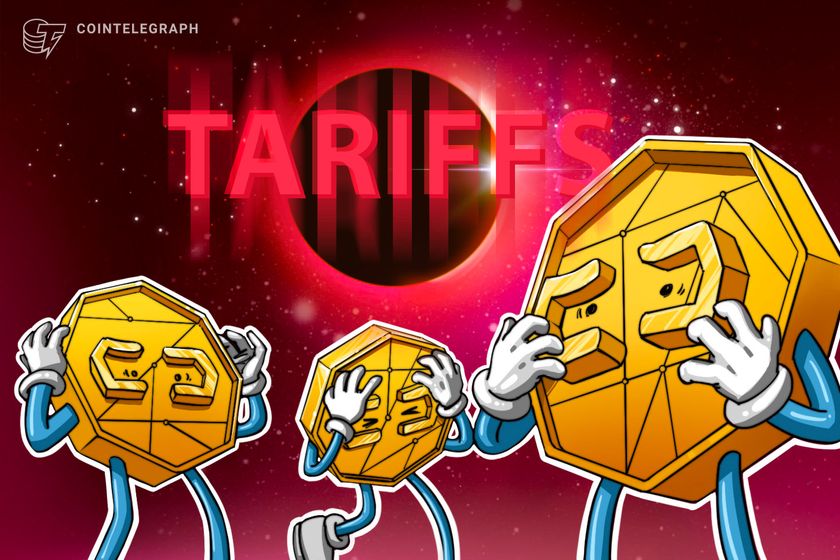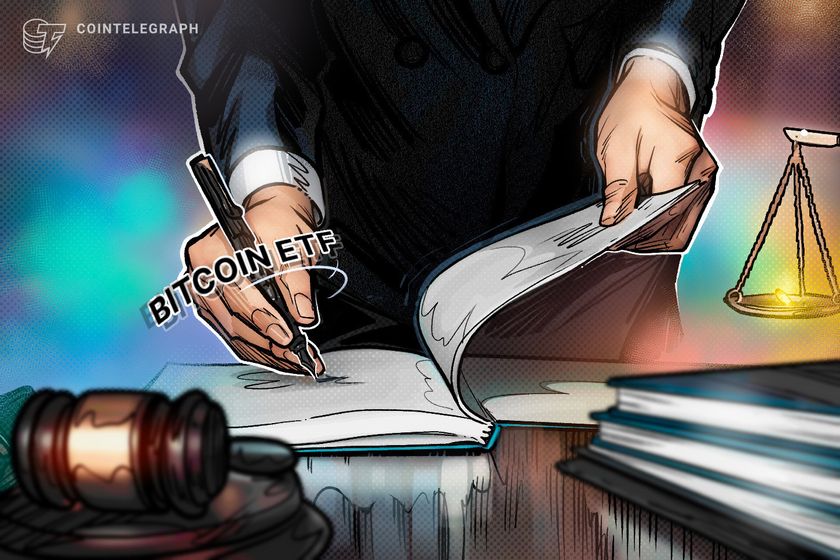

US President Donald Trump introduced a slew of tariffs on April 2, sending markets into a tailspin and dividing crypto observers as to their possible long-term effects.
At a special event at the White House, Trump signed an executive order and claimed emergency powers, leveling reciprocal tariffs at every country that has a tariff on US goods, starting at a 10% minimum.
The long-term effect that this swathe of new taxes could have on global markets is unknown. The uncertainty is compounded by the ambiguous methodology the Trump administration used to determine the tariff rates.
Some believe that the crypto market is due for a boom as investors seek an alternative for traditional investments. Others note the effect tariffs could have on mining equipment, hampering profitability. More still are concerned about the broader impact of tariffs and a possible recession.
Trump’s tariffs “provide certainty” for markets
Financial markets crashed immediately on the news of the tariffs, with crypto markets no exception.
Bitcoin (BTC) had nearly reached a session high at $88,500 but dropped 2.6% back to around $83,000. Ether (ETH) fell from $1,934 to $1,797 immediately following the tariff announcement, and the total crypto market capitalization dropped 5.3% to $2.7 trillion.
Crypto shows red across the board after Trump’s tariff order. Source: Coin360
Some market analysts aren’t shaken. Trader Michaël van de Poppe wrote that the tariffs “won’t be as bad as the entire population expects them to be.”
“Uncertainty fades away. Gold will drop. ‘Buy the rumor, sell the news,’” he said. “Altcoins & Bitcoin goes up. ‘Sell the rumor, buy the news.’”
BitMEX founder Arthur Hayes said that while the tariffs may reduce the trade deficit, fewer exports could limit the demand for US Treasurys, requiring domestic intervention from the Federal Reserve to stabilize the market.
“The Fed and banking system must step up to ensure a well-functioning treasury [market], which means Brrrr,” he said.
“Brrrr” — a reference to the Reserve printing more money — is a theory Hayes has previously suggested could be positive for Bitcoin’s price as increased liquidity enters the market.
What about crypto miners?
American crypto miners may have less cause for optimism about the tariffs, as they are directly affected by the markups on goods — namely crypto mining rigs — imported from Asia.
Mitchell Askew, head analyst at mining-as-a-service firm Blockware Solutions, said: “Tariffs have MASSIVE implications for Bitcoin Miners. [Expect] off-shore supply to get squeezed, increasing demand for on-shore miners. If this is coupled with a BTC run we could see ASIC [mining rig] prices rip 5 to 10x like they did in 2021.”
Mason Jappa, CEO of Blockware, said that the tariffs will have “a major impact” on the Bitcoin mining industry. “Most of the current Bitcoin Mining Server imports were coming from Malaysia/Thailand/Indonesia. Rigs already landed in the USA will become more valuable,” he wrote.
Related: Crypto miner backs US senator’s efforts to incentivize using flared gas
Some mining companies are already rushing to get mining rigs out of the export country before the tariffs take effect. Lauren Lin, head of hardware at Bitcoin mining software firm Luxor Technology, told Bloomberg on April 3 that her firm was “scrambling.”
“Ideally, we can charter a flight and get machines over — just trying to be as creative as possible to get these machines out,” she said.
Tariffs’ doubtful math, “extraordinary nonsense,” and a looming recession
The convenient tariff percentage charts displayed at the signing event at the White House left many questioning exactly how the Trump administration came up with the numbers and why certain countries were chosen.
Yale Review editor James Surowiecki wrote that the administration didn’t actually calculate tariff rates plus non-tariff barriers to determine their rates, but rather “just took our trade deficit with that country and divided it by the country’s exports to us.”
“What extraordinary nonsense this is.”
Some have even floated the theory that the administration used ChatGPT to come up with the countries and numbers. NFT collector DCinvestor said that he was able to nearly exactly duplicate the list through prompts on the generative AI.
“I was able to duplicate it in ChatGPT. it also told me that this idea hadn’t been formalized anywhere before, and that it was something it came up with. ffs Trump admin is using ChatGPT to determine trade policy,” he said.
Also of note: some of the smaller countries and territories on the White House’s list. The full list, as reported by Forbes, levies a 10% tariff on the Heard and McDonald Islands in response to their 10% duties on the United States.
The Heard and McDonald Islands are uninhabited, barren and some of the most remote places on earth, located 1,600 km from Antarctica. No one lives there; no trade exists.
Heard Island, a snow-covered rock. Source: Wikipedia
The dubious maths and contents of the tariff list have many doubting the administration’s economic calculus.
Nigel Green, CEO of global financial advisory giant deVere Group, told Cointelegraph that the president “peddles in economic delusion.”
“It’s a seismic day for global trade. Trump is blowing up the post-war system that made the US and the world more prosperous, and he’s doing it with reckless confidence,” he said.
Related: Lawmaker alleges Trump wants to replace US dollar with his stablecoin
Adam Cochrane, a partner at Cinneamhain Ventures, said that tariffs “work great for most of those things” when they target industries that also have present-day production to offset the increased cost of imported goods.
“The US doesn’t have that, nor the factories for it, not the labor to offset it, nor the raw materials for it. So you end up just paying more for the same good.”
At the end of March, Goldman Sachs had already tipped the chance of a recession in the US at 35%. After Trump signed the order, betting markets on Kalshi increased that to over 50%.
Betting markets aren’t betting on the American economy. Source: Kalshi
Trump, for his part, contended that the tariffs will “make America great again” and give the US economy a competitive edge with its former allies and trade partners. He argued in his signing speech that the Great Depression of the 1930s would have never happened if tariffs had been maintained.
The Smoot-Hawley Tariff Act, which raised tariffs during the Depression, is widely credited as being a contributing factor to worsening the Depression and has become synonymous with disastrous economic policymaking.
Magazine: Financial nihilism in crypto is over — It’s time to dream big again



